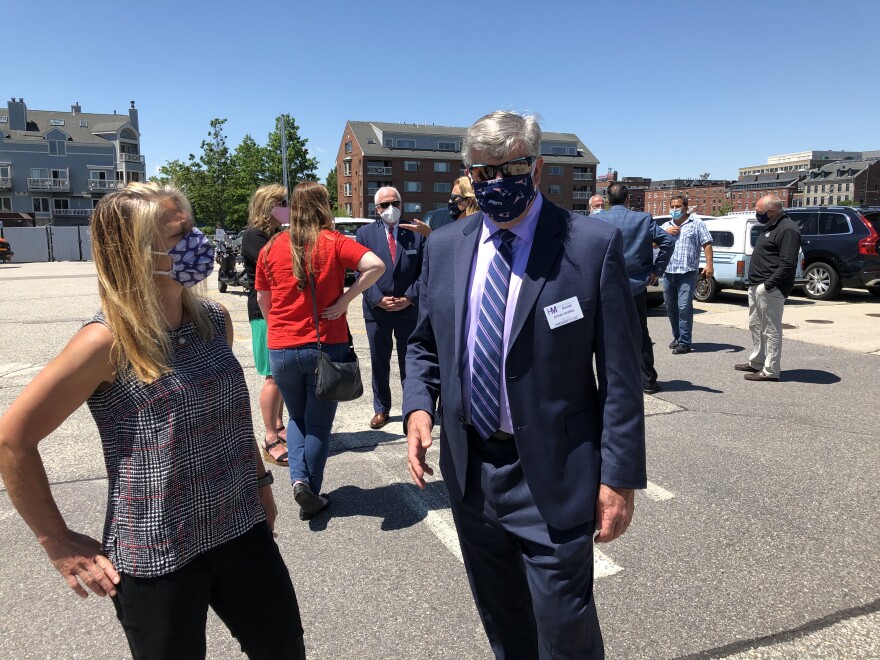For more than a week, Maine, New Hampshire and Vermont have been encouraging travel around northern New England as a step toward reviving their tourism-dependent economies that have been suppressed by the pandemic. But where exactly you hail from can make a big difference in your ability to move about freely.
Last week Maine Gov. Janet Mills threw open the doors for New Hampshire and Vermont residents to visit and stay in Maine without any sort of quarantine.
"As you look at the data, the three states have similar health outcomes," says Heather Johnson, Maine's commissioner of Economic and Community Development.
With case rates that have generally been much lower than urban areas in New England, and with daily case rates declining in all three states since mid-May, Johnson says it made sense for Maine to revise the rules.
"Once you get outside of the (three) states, it's a pretty big difference, so it became clear that was a logical break point."
Unlike Maine, New Hampshire is not making distinctions among travelers from northern and southern New England, or anywhere else.
“The current policy is that New Hampshire residents are welcome to move about the state freely, stay in lodging properties etcetera,” says Mike Somers, president of the New Hampshire Lodging and Restaurant Association. “Out-of-state visitors are required to essentially attest that they have been isolated, at home, for 14 days.”
Lodging operators are asked to get guests to sign a document attesting that they have met the standard and do not have any symptoms.
"I think it certainly presents challenges, don't get me wrong. This time of year all of us northern New Englanders certainly enjoy having out-of-state visitors. It's a big part of our local economies. And so these businesses are legitimately trying to figure out ways to navigate this."
That makes New Hampshire hotel and campground operators the envy of some of their counterparts in Maine, where most out-of-state visitors are barred until the very end of the month. Even then they will face an array of options for quarantines or testing lodging operators say are a turn-off for potential visitors.
Tina Hewitt-Gordon is the general manager of Kennebunkport's seaside Nonantum Inn. She says every time the state adjusts its travel rules, southern Maine sees a rash of cancellations.

"So if they're not staying at our hotels they're not going to the restaurants, they're not going to the retail shops,” Hewitt Gordon says. “And the long-term effect is just devastating, because what happens next year when they go to make their travel reservations they say 'hey, wait a minute, we really had a great time in New Hampshire, let's not go to Maine let's go to New Hampshire.' "
Hewitt-Gordon is also steamed that Massachusetts, where COVID-19's statewide toll has been monstrous compared to Maine's, is asking lodgings for less from customers. Everybody, she says, is fleeing for Cape Cod.
“They have no enforcement,” she says. “They're required to advise people that they need to quarantine for 14 days. They don't have to have any compliance form, they have none of those restrictions. Chatham Bars Inn booked 4,300 room nights in the last 21 days.”
Gary Thulander is managing director of the Chatham Bars Inn.
"It's actually grown. Actually, we've booked just under 6,000 room-nights in the last 28 days. 6,000."
Thulander says there has been a surge in bookings since Massachusetts opened hotels on June 5. Competing resort towns, he points out, have more restrictive rules.
“Us having an advisory versus a mandatory, unfortunately, puts other states at a disadvantage. I've talked to some of my peers in those states and they are very nervous, they have very little room nights on the books, and I feel pretty badly to be honest with you.”
Vermont, meanwhile, is taking the most targeted approach among the New England states. Travelers from counties in New England and New York where infection rates are below 400 per million people are free to visit Vermont without restriction. But those from counties where infection rates are higher must follow specific quarantine or testing rules.
Map of quarantine and non-quarantine counties throughout New England and New York. Data from vermont.gov.
Vermont's Department of Financial Regulation publishes an interactive, color-coded map that shows infection rates by county in the entire region. Mike Pieciak is its Commissioner.
"Just like Maine, Vermont is a big tourist destination, so we thought by sort of going at a more granular county by county level we could open up our map more fully and actually welcome more people in, in a safe manner."
Hoteliers there have complained that all but one Massachusetts county are so-called "quarantine counties," where there are more than the 400 million case per million cut-off, as is most of New York state below Albany. But Pieciak says that since the rule was adopted two weeks ago, the number of non-Vermonters who could travel to the Green Mountains with no restrictions grew from 3.6 million to 4.6 million.
He acknowledges that the potpourri of travel polices can seem frustratingly arbitrary.
"One of the outcomes of limited federal leadership is that states are well-positioned to create policy for themselves but then once you look at how do these policies interplay with each other in a region it can get very complicated."
Maine Economic and Community Development Commissioner Heather Johnson says state officials did consider an approach that would attempt to greenlight visitors from low-caseload areas. They opted instead for what seemed simpler rules for industry to follow. But, she adds, that as the effort to re-open continues, they continue to examine all options.



